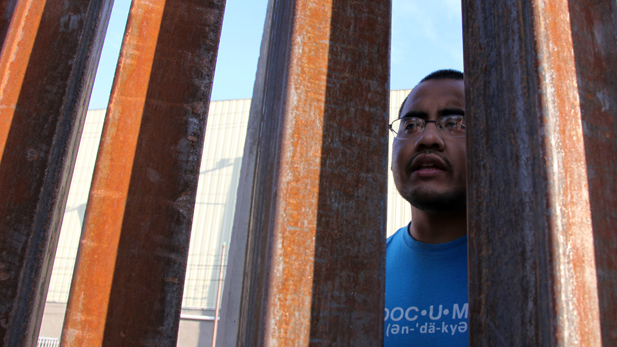Story by Fernanda Echavarri and Andrea Kelly
 Marco Saavedra, 23, at border fence in Nogales last month. His asylum request was pending.
Marco Saavedra, 23, at border fence in Nogales last month. His asylum request was pending.Listen
A group of nine undocumented immigrants who lived in the U.S. for years but recently left the country will attempt to cross back through a port of entry Monday morning.
Among the nine are at least two "dreamers," young adults who were brought without documents to the United States when they were minors. The nickname comes from the proposed federal DREAM Act, which would give legal status to those brought to the country without documentation when they were children.
They said among their goals in attempting Monday's crossing is to highlight the case for themselves and others like them to be given legal status.
Marco Saavedra, 23, and Lizbeth Mateo, 29, said they both came to the country as children, and both recently returned to Mexico to visit family.
Saavedra, who did not disclose where he lived in the U.S., said he came to the country when he was 3. He said he was attempting the crossing Monday to show support for other young undocumented people who have left the U.S. or have been deported.
“Obviously the risk (of arrest and deportation) always exists, but I think the biggest risk is always being separated from our families on the U.S. side or on the Mexican side,” said Saavedra, who was undergoing deportation proceedings when he departed. “I think that just weighs down on you after like two decades of not seeing one side of your family.”
Mateo, who lived in Arizona, said she came to the U.S. when she was 14 and departed voluntarily two weeks ago to show support for deportees, and to visit family members whom she had not seen in years, she said.
“I’m doing this because we want the U.S. government, the Obama administration, to actually do something so that young people like ourselves, like the five that are going back with us tomorrow, and many others who are waiting in Mexico and other countries, can actually go back home,” Mateo said.
Not knowing if they will be allowed back is scary, Saavedra said, but he hopes their action will spotlight issues surrounding the DREAM Act, and those who fall under President Barack Obama's executive order for a program that gives them two years of legal status, known as the Deferred Action for Childhood Arrivals program.
Eligibility requirements for the program include coming to the country illegally before the age of 16 or living in the country since before the age of 16 with expired visitor permits. Among other requirements, applicants must be between 15 and 31 years old, have lived in the U.S. for the past five years, be currently enrolled in or have graduated from high school.
Saavedra said he did not apply for the program because he was already under a deportation order. Mateo said she did not apply because she was able to enroll in law school, and undertake other activities without having to prove her legality.
Mateo said current law and the deferred action program present her and others with a legal dilemma.
“There’s really no legal avenue that we can apply to, to actually get an actual legal status,” she said. “But we’re asking the government to have discretion in our cases and let us back into the country so that we can keep fighting for the DREAM Act, so that we can keep fighting for laws that can benefit us and our families.”
The eight said they will attempt to enter at the Morley Gate, a pedestrian-only crossing in Nogales. Anyone using that or any other legal border crossing spot are required to show federal border agents their documentation, including valid passports and U.S. visas.

By submitting your comments, you hereby give AZPM the right to post your comments and potentially use them in any other form of media operated by this institution.